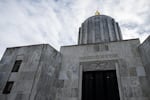Oregon Senate President Peter Courtney has a well-worn speech about the dangers posed by special Legislative sessions.
Courtney has been called into these extracurricular sessions more than a dozen times in his 32-year legislative career, and frequently blanches at the prospect of bringing lawmakers back to the Capitol with no set time limits, and few guardrails. His conclusion: Such sessions must be extremely limited in scope, and they require wide buy-in from both parties before lawmakers convene.
The special legislative session Gov. Kate Brown has set for Wednesday appears to meet almost none of Courtney’s requirements.

Democratic Oregon Senate President Peter Courtney watches from the dais in the Senate chambers at the Oregon Capitol in Salem, Ore., Tuesday, April 2, 2019.
Bryan M. Vance / OPB
As Oregon battles the COVID-19 pandemic and seeks to respond to persistent calls for police accountability, the Legislature is preparing a session unprecedented in its restrictions on public access, yet expansive in scope.
When lawmakers convene June 24, they could take up dozens of bills on a wide range of topics. Social distancing requirements will likely slow the typically streamlined legislative process. All that has lawmakers worried their unusual summer session will turn into an unwieldy beast.
At the same time, there's still uncertainty about just how much lawmakers should tackle, and lingering resentment among members of both parties about what the session is not going to touch: A looming budget shortfall that will likely require meaningful cuts to state services.
“I’m going in, and I’ll do whatever I can to make it work, and that’s where my head is,” Courtney, D-Salem, said last week. “How we got into this session, whether we should be in this session, or whether I like it is irrelevant.”
Here’s what Oregonians should expect.
Police accountability and COVID relief
With nationwide protests over the killing of George Floyd ongoing, Brown has made it clear she wants the session to focus on police oversight.
Related: Oregon Lawmakers See Opening For Police Reform, But Change Won't Come Quickly
The governor has thrown her support behind six police accountability measures raised by the Legislature’s nine-member People of Color Caucus. Those include: bills to ban the use of chokeholds and create a statewide police discipline database; a measure to make it easier for police officers to be fired if found guilty of misconduct; another requiring police to report misconduct of other officers; and a measure to have the Oregon attorney general lead investigations when police use of force results in death or serious injury.
Lawmakers have also proposed tackling other topics, such as starting an inspection program for meat processing plants, addressing issues with the state’s child welfare system and changing the state’s aerial spraying regulations.
Some of these are bills that perished when Republicans staged a walkout during a regular legislative session earlier this year, effectively killing climate change legislation. One of those is a bill that would make it easier for cities and local jurisdictions to site homeless shelters, a priority of House Speaker Tina Kotek, D-Portland. Other measures appear aimed at solidifying Republican support, such as making changes to a newly created business tax to support education.
Lawmakers also plan to address needs created by the coronavirus pandemic.
In March, Brown issued executive orders banning residential and commercial evictions during the health crisis. Those protections are set to expire at the end of the month — and were nearly overturned by a Baker County judge before the state Supreme Court stepped in. Legislators will likely consider extending them for another 90 days.
Other proposals include requiring landlords to offer payment plans and banning them from charging late fees. The governor said she also hopes legislators consider how to stop a foreclosure crisis from developing.
A fight over the budget
The biggest controversy over the special session so far is what has been left out.
Brown and legislative leaders had initially planned a session that would take up at least some budgetary tweaks — a situation warranted by the $2.7 billion hit to the current state budget expected to be brought on by efforts to block the spread of the coronavirus. While the governor has blunt authority to slash agency budgets across the board, lawmakers are able to more precisely balance the state's $85.8 billion budget via a mix of cuts, reserve spending, allocating federal aid and, potentially, raising taxes.
As recently as 10 days ago, top lawmakers in the House and Senate were planning to convene hearings allowing the public to weigh in on possible spending cuts. But in mid-June, word began to circulate that Brown had changed her mind, and that budget fixes would have to wait for a separate session later this summer.
Related: The Coronavirus Will Blow An Enormous Hole In Oregon's Budget, Economists Say
“I was told on Sunday, [June 14],” said Sen. Elizabeth Steiner Hayward, a Portland Democrat who co-chairs the Legislature’s budget writing committee and had been adamant along with others in the Senate that lawmakers needed to begin the process of curbing costs now. “I’m disappointed and frustrated.”
In announcing a hold on budget discussions, Brown cited her hope that the U.S. Congress would respond to pressure to increase financial help to states. If Oregon has reason to expect hundreds of millions of dollars in additional federal money, she said, it doesn’t make sense to budget for cuts that might not be necessary.
“Unless the federal government takes action, states like Oregon could be forced to make significant cuts to schools, health care, and senior services,” Brown said in a statement.
The governor’s vision is shared by some in the Capitol. Kotek professed support for the approach following Brown’s announcement. And state Rep. Dan Rayfield, D-Corvallis, another chair of the Legislature’s budget-writing committee, told OPB that Brown’s strategy has merit.
“The problem with moving as quickly as you can is you’re going to make mistakes,” he said. “I don’t think it’s necessarily a bad idea to wait to see what the federal funding is.”
According to Steiner Hayward, Brown’s bet on additional federal funding comes in part from assurances offered by Vice President Mike Pence, who holds regular calls with governors, that Congress will take up a package in July.
“I think it’s a mistake,” said Steiner Hayward. “We should be doing at least some basic budget adjustments before the next fiscal year [on July 1]. We cannot count on the feds to do anything in a timely fashion.”
Courtney, the Democratic Senate president, echoed concerns about relying on the federal government. He said the decision to strip the budget from the conversation “came out of nowhere” but that he trusts the governor had more information about a federal relief package than he does.
“The governor is convinced we’re going to get money in July from Congress. I’m worried about that because I don’t know what Congress is doing … and I don’t have a lot of faith right now that they are going to come in with a lot of dollars,” Courtney said.
These concerns aren’t limited to Democrats. Top Republicans in both chambers have questioned the decision to delay tough budget choices, reasoning along with Democratic skeptics that entities like school districts need more certainty on how their state funding will be impacted as they finalize their own budgets, and that necessary cuts or layoffs should be put into place sooner rather than later.
“This one is flawed from the start,” Sen. Minority Leader Fred Girod, R-Stayton, told OPB. “The very essence of what we do as a Legislature is to balance the budget, and it remains unbalanced.”
In the House, Minority Leader Christine Drazan, R-Canby, said Tuesday that the special session “must not ignore the urgent need to provide certainty for our state’s safety net programs, schools, community corrections and human services by balancing the budget.”
Despite that outcry, there has been no indication the governor is likely to reconsider, and planned committee hearings on possible budget cuts have been canceled.
A session like no one has ever seen
COVID-19 promises to make day-to-day business in the Capitol practically unrecognizable from the typical bustle of a session.
According to plans floated last week, the public will be banned from entering the Capitol as lawmakers debate within. Instead, they’ll be forced to testify remotely — including, potentially, from a laptop set up on the Capitol steps.

The Oregon Capitol is pictured Wednesday, Feb. 20, 2019, in Salem, Ore.
Bradley W. Parks / OPB
Within the building, lawmakers expect to attend committee meetings via computer, and to vote and deliberate from their offices or elsewhere. While floor votes need to be conducted in person, legislators have discussed social distancing guidelines that would allow lawmakers to attend floor sessions from within their offices and only enter the chamber to debate a bill or cast votes.
Only a set number of the House’s 60 members will be allowed in the chamber at one time, while Senate leaders say all 30 senators should be able to fit within that chamber and still abide by appropriate distancing measures.
In the House, Kotek is planning rules that would require lawmakers to wear face masks. “That would be a rule of the House, similar to what we have now about how people should dress on the floor,” she said in a call with legislators Thursday.
The Senate's Courtney is imposing no such rule, though he urged all lawmakers to wear masks. “I’m not a dictator, so I can’t go out there and remove you from the floor,” he told senators in a video conference Friday. “I would just beg you.”
Related: OPB Politics Now: Special Legislative Session Preview
Still somewhat unclear is how a face mask mandate Brown is instituting on Marion County, along with six other counties, will work in the Capitol. Dexter Johnson, the Legislature’s chief lawyer, told lawmakers Friday that the order, which applies to indoor public spaces, likely includes the statehouse.
“The question is how enforceable that is, with respect to members [of the Legislative Assembly],” Johnson said. “Any enforcement would be a function of the body itself.”
Both Courtney and Kotek have told their members they are allowed to stay home from the session if they feel it will put them in harm’s way, though absent lawmakers would be barred from casting floor votes.
One of the keenest ways social distancing guidelines might be felt, officials said, is in the timing of the session. Lawmakers are adept at passing bills at blistering speed when both parties agree and time is of the essence.
Even if major disagreements can be avoided this time around, though, social distancing guidelines and other precautions are sure to slow the pace of debate and floor votes. Kotek told members who live far from Salem to plan to stay nearby for two nights, at minimum. That could stretch well longer, depending on any disagreements that could fester in the fragile dynamics of the building.
As of late last week, such disagreement — a bane of Courtney’s special session ideal — appeared distinctly possible.
“I remain concerned about abiding by the intent of the constitution and preserving the voices of the minority in this process,” said Drazan, the House Republican leader. “Hopefully we’ll have agreement and everyone will see the bills in advance and there will be enough vetting of these issues among our caucus and the public realm.”